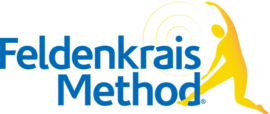By MaryBeth Smith
The memory is vivid. I remember those intoxicating early experiences after an Awareness Through Movement® lesson, when I marveled at how much change was possible. I soon began to notice my smallest habits: which leg went into my jeans first? Which shoe did I put on first? In a parking lot, did I choose the empty spot to the right or to the left? Then I started “shaking things up,” creating variations and new options, discovering that there was more than one way to do most things. I also realized that my habits had prevented me from exploring many challenging ideas. After about nine months of private lessons, I entered my Feldenkrais® teacher training program. At the end of the first month, I traveled home with the realization that, despite years of psychotherapy and in-depth internal work, I had only begun to scratch the surface of understanding “Me.”
I recall several instances where Moshe Feldenkrais either said or wrote that if you can get a student to like themselves — perhaps even love themselves– then you have provided them with the most valuable experience of their lives. During that Falling in Love period, the feelings grow stronger if you discover your own resilience, creativity, persistence, and internal wisdom. The work celebrates subjective experience, doing what feels good, learning and leveraging past experiences on a path of seemingly endless self improvement. We may come to embrace Inner strength we didn’t know we had. We might discover the value of “the examined life.” “I” am the subject of every sentence in my own life. The choices I make and the actions I take can be aware and informed, or not. Individuality, and the internal locus of control, are powerful concepts that can take root and flower into vibrant, rewarding living.
In the first few years after graduation, I began to observe in others first, and eventually in myself, that self-awareness could easily morph into self-absorption. My ability to notice delicate distinctions and refinements fed my ego and made me feel like the fabled Princess on a pea eradication campaign. I also observed a degree of smug intellectual satisfaction in refusing to ever provide “an answer” that also made me pause. I wondered: at what point does individuality become a liability rather than an asset? At what point does learning, exploring, and keeping an open mind turn into time-wasting? At what point does the internal locus of control become nothing more than weaponized contrarianism?
One of many insights contained in The Elusive Obvious (1981, M. Feldenkrais) is that, although we are individuals having our own experiences, we are not alone. We are part of an environment characterized by this planet’s gravity, light spectrum, objects to be navigated and manipulated, and other people. We are born into a vast, complex, and sometimes chaotic system. Changes to the system can be abrupt, perturbing, and challenging to our internal sense of self and survival. Societies and cultures have arisen as humans have come together to agree upon how best to live together. From time to time, existing societies, cultures, institutions, and systems also undergo change so that the entire system can function at a higher level.
My understanding of the Feldenkrais Method® is that we are constantly looking inward and outward. We constantly “recalibrate” based on new and changing information. Our relationships with family, significant others, and neighbors can have immediate physical and emotional effects. Individuality that takes the form of a “my way or the highway” attitude with an employer or spouse usually leads to a dysfunctional outcome. With the resurgence of COVID-19 in many states, including my home state of Texas, some have taken their idea of individuality, personal freedom, and autonomy to behaviors that hurt themselves and others. Clearly, to function better, we have to “balance the equation:” Individuality, self-determination, and personal agency is on one side, and our human hunger to connect with others and be happy is on the other. This requires adaptation internally, and cooperation externally.
In the preface of The Elusive Obvious, Moshe Feldenkrais writes:
“The Elusive Obvious deals with simple, fundamental notions of our daily life that through habit become elusive. “Time is money” is obviously a good attitude to have in business or work. It is ot at all obvious that in love the same attitude is the cause of so much unhappiness. We often make mistakes. We carry over from one activity to another attitudes of mind that do not make life what it could be. . .
. . .Many troubled relationships come from inadvertently carrying over seemingly good habits of thought to where they do not apply. Somehow we behave as if good habits are always good. We think, or rather feel, that we need not bother about behaving otherwise. It is not so obvious that good habits can make us unhappy. It is an elusive truth. Yet habitual lack of free choice is often, nay, usually, disastrous.
If you come across something obviously new to you, in its form at least, please stop for a moment and look inward. Working out new alternatives assists us to grow stronger and wiser. . .”
As we continue our practice of the Feldenkrais Method during this historic period of “trial and error” on a massive scale, there will certainly be many trials and many errors. We might begin to practice viewing others as filled with potential, just as we are. What if individuals can come together, free of their habits and traumas, so that our nervous systems can withstand the shock of difference without reverting to “Princess mode?” As I read Moshe’s vision for a better world, it’s clear that the path begins with each individual — but it doesn’t end there.
Mary Beth Smith is a Feldenkrais practitioner in Houston.
Originally published on SomaQuest blog: http://www.houstonfeldenkrais.com/2020/06/29/individualism-and-self-reliance-the-elusive-obvious/

